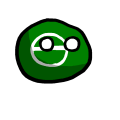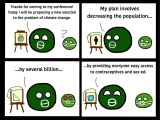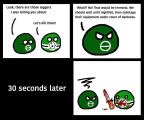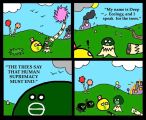imported>Polcompbot m (Standardized file syntax) |
imported>Polcompbot m (Formatting consistency changes) |
||
| Line 39: | Line 39: | ||
'''Deep Ecology ''' is a philosophy that believes that all species are an equally important aspect of the world's ecology, and should be treated as equals. He is typically economically and culturally left, but his principal aspect is his extreme [[File:Envi.png]][[Environmentalism|environmentalism]]. | '''Deep Ecology ''' is a philosophy that believes that all species are an equally important aspect of the world's ecology, and should be treated as equals. He is typically economically and culturally left, but his principal aspect is his extreme [[File:Envi.png]][[Environmentalism|environmentalism]]. | ||
== History == | ==History== | ||
Deep ecology originated in 1973 by an article by Arne Næss where he claimed that he was inspired by ecologists who were studying ecosystems around the world. The three main influences of deep ecology are conservationist Rachel Carson, environmentalist David Brower, and biologist Paul R. Ehrlich. Rachel Carson's book Silent Spring (1962) is considered the beginning of the contemporary movement. The formation of Greenpeace also had a great influence on deep ecology. | Deep ecology originated in 1973 by an article by Arne Næss where he claimed that he was inspired by ecologists who were studying ecosystems around the world. The three main influences of deep ecology are conservationist Rachel Carson, environmentalist David Brower, and biologist Paul R. Ehrlich. Rachel Carson's book Silent Spring (1962) is considered the beginning of the contemporary movement. The formation of Greenpeace also had a great influence on deep ecology. | ||
== Personality == | ==Personality== | ||
Deep Ecology is more environmentally radical than [[File:Envi.png]] [[environmentalism]], which attempts to protect a group of animals from hunters and forests being cut down by lumberjacks and machines that cut trees. | Deep Ecology is more environmentally radical than [[File:Envi.png]] [[environmentalism]], which attempts to protect a group of animals from hunters and forests being cut down by lumberjacks and machines that cut trees. | ||
== How to Draw == | ==How to Draw== | ||
{{Flag|Deepeco_flag.svg}} | {{Flag|Deepeco_flag.svg}} | ||
# Draw a ball | # Draw a ball | ||
| Line 83: | Line 83: | ||
*[[File:Annil.png]] [[Anarcho-Nihilism]] - You don't care about the environment! But you also prefer animals over humans which is not bad. | *[[File:Annil.png]] [[Anarcho-Nihilism]] - You don't care about the environment! But you also prefer animals over humans which is not bad. | ||
===Enemies=== | ===Enemies=== | ||
*[[File:Indust.png]] [[Industrialism]] - DIE YOU SMOG MAKING, TREE CHOPPING, ANIMAL BEATING, HUMAN RIGHT VIOLATING, FACTORY CHURNING, DICKHEAD! | *[[File:Indust.png]] [[Industrialism]] - DIE YOU SMOG MAKING, TREE CHOPPING, ANIMAL BEATING, HUMAN RIGHT VIOLATING, FACTORY CHURNING, DICKHEAD! | ||
| Line 95: | Line 95: | ||
==Further Information== | ==Further Information== | ||
===Wikipedia === | ===Wikipedia=== | ||
*[[w:Deep_ecology|Deep ecology]] | *[[w:Deep_ecology|Deep ecology]] | ||
Revision as of 00:15, 9 June 2023
Script error: No such module "Mbox". Script error: No such module "Mbox".
Deep Ecology is a philosophy that believes that all species are an equally important aspect of the world's ecology, and should be treated as equals. He is typically economically and culturally left, but his principal aspect is his extreme ![]() environmentalism.
environmentalism.
History
Deep ecology originated in 1973 by an article by Arne Næss where he claimed that he was inspired by ecologists who were studying ecosystems around the world. The three main influences of deep ecology are conservationist Rachel Carson, environmentalist David Brower, and biologist Paul R. Ehrlich. Rachel Carson's book Silent Spring (1962) is considered the beginning of the contemporary movement. The formation of Greenpeace also had a great influence on deep ecology.
Personality
Deep Ecology is more environmentally radical than ![]() environmentalism, which attempts to protect a group of animals from hunters and forests being cut down by lumberjacks and machines that cut trees.
environmentalism, which attempts to protect a group of animals from hunters and forests being cut down by lumberjacks and machines that cut trees.
How to Draw
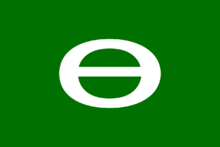
- Draw a ball
- Colour it dark green (#007000)
- Draw a white circle but don't fill it in
- Draw a white diameter for the circle going horizontally
- Add the eyes and you're done!
| Color Name | HEX | RGB | |
|---|---|---|---|
| Green | #007000 | 0, 112, 0 | |
| White | #FFFFFF | 255, 255, 255 | |
Relationships
Friends
 Veganarchism - Sometimes I go to the vegan farmers market with him.
Veganarchism - Sometimes I go to the vegan farmers market with him. Environmentalism - Hi mom!
Environmentalism - Hi mom! Progressivism - Progress!
Progressivism - Progress! Eco-Anarchism - One of my best friends!
Eco-Anarchism - One of my best friends! Eco-Socialism - Great ideas!
Eco-Socialism - Great ideas! Post-Industrialism - Thanks for stopping industrialism!
Post-Industrialism - Thanks for stopping industrialism! Anti-Humanism - Humans exceptionalism is nonsense. And we both hate being confused for misanthropy.
Anti-Humanism - Humans exceptionalism is nonsense. And we both hate being confused for misanthropy.




 All other environmentalists - Godspeed!
All other environmentalists - Godspeed!
Frenemies
 Primalism - Your rights will be protected, but I don't want to return to monke (that's misanthropy). I want for monkeys and humans to peacefully coexist.
Primalism - Your rights will be protected, but I don't want to return to monke (that's misanthropy). I want for monkeys and humans to peacefully coexist. Eco-Authoritarianism - Uh, calm down?
Eco-Authoritarianism - Uh, calm down? Eco-Fascism - Yeah, you too.
Eco-Fascism - Yeah, you too. Neoluddism - You're a bit too wacky tbh.
Neoluddism - You're a bit too wacky tbh. Technocracy - Some good ideas, but too statist and sometimes "forgets" to care for the environment.
Technocracy - Some good ideas, but too statist and sometimes "forgets" to care for the environment. Nazism - Cruel, soulless tyrant... who cared about animal rights?
Nazism - Cruel, soulless tyrant... who cared about animal rights? Voluntary Human Extinction - When I said all species are equal and deserve to live, that included humans too! And I am not a misanthrope.
Voluntary Human Extinction - When I said all species are equal and deserve to live, that included humans too! And I am not a misanthrope. Anarcho-Nihilism - You don't care about the environment! But you also prefer animals over humans which is not bad.
Anarcho-Nihilism - You don't care about the environment! But you also prefer animals over humans which is not bad.
Enemies
 Industrialism - DIE YOU SMOG MAKING, TREE CHOPPING, ANIMAL BEATING, HUMAN RIGHT VIOLATING, FACTORY CHURNING, DICKHEAD!
Industrialism - DIE YOU SMOG MAKING, TREE CHOPPING, ANIMAL BEATING, HUMAN RIGHT VIOLATING, FACTORY CHURNING, DICKHEAD! Apoliticism - STOP GRILLING ANIMALS!
Apoliticism - STOP GRILLING ANIMALS! Posadism - DON'T NUKE THE EARTH!
Posadism - DON'T NUKE THE EARTH! Climate Skepticism - Unlike the other polluters who at least have some kind of good intentions (as horribly misguided as they are), you're just plain evil for the sake of being evil.
Climate Skepticism - Unlike the other polluters who at least have some kind of good intentions (as horribly misguided as they are), you're just plain evil for the sake of being evil. Libertarian Municipalism - I would like you more, but STOP CALLING ME FAKE ECOLOGY!!! I AM NOT A MISANTHROPE!!!
Libertarian Municipalism - I would like you more, but STOP CALLING ME FAKE ECOLOGY!!! I AM NOT A MISANTHROPE!!! Humanism - Stop human supremacy, start treating monkeys like equals too.
Humanism - Stop human supremacy, start treating monkeys like equals too. Post-Humanism - He hates all biological organisms, basically my opposite.
Post-Humanism - He hates all biological organisms, basically my opposite.
Further Information
Wikipedia
Articles
Other
Gallery
| | |
